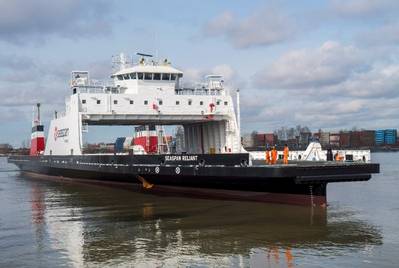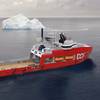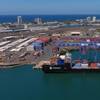Seaspan Ferries to Trial Corvus' New Blue Whale ESS
Canadian operator Seaspan Ferries Corporation said it will be the first to trial Corvus Energy’s new Blue Whale ESS, featuring a unique rack-free design of stacking modular blocks to provide higher volumetric battery room energy density and, consequently, maximized passenger or payload capacity.
The new large-scale energy storage system (ESS)—a battery system designed for large ships with high zero-emission energy demand, such as cruise ships, large Ro-Pax and Ro-Ro ferries and cargo ships—will be installed on board Seaspan Reliant, a roll-on/roll-off drop-trailer cargo ferry built in 2016 that sails the Salish Sea multiple times a day, with terminals and service between B.C.’s Lower Mainland and Vancouver Island.
For its inaugural field trial, the Blue Whale ESS will replace an in-service first generation Corvus AT6500 ESS in the existing battery room, increasing the vessel’s energy storage capacity from 545 kWh to 1892 kWh.
“Although Seaspan Reliant is a relatively small vessel for a Blue Whale system and the retrofit will be done on a very tight schedule, the challenging conditions make it ideal for a trial site,” said Richard Wing, Chief Research & Development Officer at Corvus Energy. “Moving and situating the Blue Whale modules and pack controllers into the existing battery room will also test and validate the materials handling equipment and service tools we have developed. Moreover, during this time of restricted travel, being able to conduct the field trial in the same location as our Canadian development and manufacturing facilities is a huge benefit and allows us to stay on schedule for commercial product release.”
Sean Puchalski, EVP Strategy & Business Planning at Corvus Energy, noted that Seaspan, being among the first to install Corvus' batteries in North America, already has extensive battery systems experience and is an “ideal field trial partner”.
Installation of the new Blue Whale system is scheduled for Summer 2021, at which time Seaspan also plans to relocate the AT6500 system onto sister vessel Seaspan Swift.

Blue Whale commissioning and trials will be carried out while the vessel is in full-service operation during the remaining months of 2021. With three and a half times the previous energy capacity, Seaspan will be able to expand the use of battery power beyond spinning reserve to also provide fuel-efficient peak shaving, load balancing, and even zero-emission operation on battery power only.
Harly Penner, Director of Fleet Renewal and Maintenance at Seaspan Ferries, said, “The increased battery capacity will give us operational flexibility to enhance service levels while reducing emissions and fuel consumption.”
Once installed, performance data from the ESS will be collected automatically, analyzed and monitored remotely through Corvus’ cloud-based monitoring and optimization system, providing valuable feedback to the R&D team.
The Blue Whale field trial and all key maritime authority certifications are expected to be completed by Spring 2022, at which time commercial deliveries will commence.
“Seaspan Ferries is committed to caring for the environment, and this is an exciting opportunity to play a role in the transformation of shipping towards a greener and more sustainable industry,” said Gord Miller, VP Seaspan Ferries. “This trial will also provide valuable experience locally, as personnel from VARD Marine, BC Hydro and the University of British Columbia will provide integration design, shore charging from the grid infrastructure, and engine efficiency studies respectively—all important areas of expertise to develop as British Columbia develops its coastal emissions reduction plans.”













